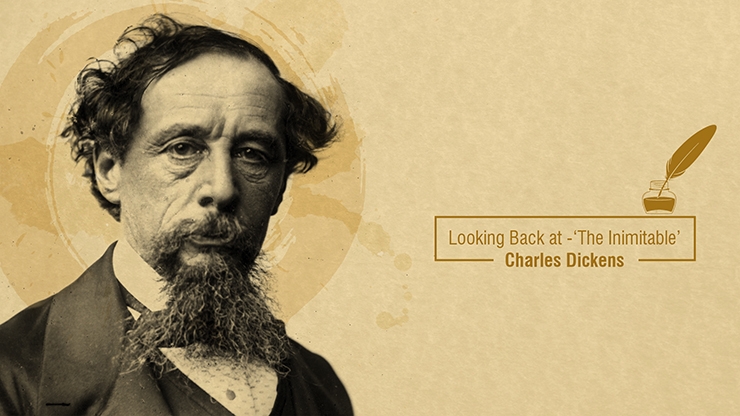Have a heart that never hardens, and a temper that never tires, and a touch that never hurts – Charles Dickens
The year 2020 completes 150 years of the death of Charles Dickens, one of the finest English novelists of all times. Sadly, the year could hardly observe commemoration of events as the fight against the Covid 19 pandemic continues worldwide. Amidst the pandemic crisis the 150th death anniversary of Charles Dickens on June 9 silently came and went by.
A few virtual conferences, a few write-ups here and there were all that could be done to pay tribute to the great novelist. This blog is written in remembrance of Charles Dickens the most prolific 19th century English writer and novelist. Dickens holds a special place in the heart of every student of English literature and his novels form an integral part of the English curriculum in colleges and universities even today.
The quintessential Victorian author, Charles Dickens wrote novels in the genre of social realism. His novels were about the common man, grounded, real, and contemporary. He wrote about their struggles and depravity, their humiliation and disgrace, their confinement and servitude their humour and pathos. Born in Portsmouth in the south coast of England, in 1812 Dickens grew up in Chatham and London. He began his literary career as a journalist and reporter. His first novel The Pickwick Papers brought him literary recognition. The novel was published by Chapman & Hall in monthly serialized form for a year. The Pickwick Papers was soon followed by 15 other novels, in addition to numerous novellas and short stories that he wrote. I was introduced to the world of Dickens as a student of an Irish missionary school. Reading Dickens was an absolute delight for me all through my school going years in the classroom and beyond it. Dickens picked up universal themes as subjects of his novels and unfolded his stories in the grandest possible way. He portrayed personality traits that seem all so familiar to us, his messages about poverty and charity have travelled through centuries, and we learn from the experiences of his characters as we learn from our own.
“The Inimitable” as he often called himself Dickens wrote immortal classics as Oliver Twist, David Copperfield, and A Christmas Carol. Through real life stories he would narrate and champion the cause of child labour, education, poverty, workhouses, and even the plight of the ‘fallen women’ in Victorian society. He brought before his readers the grim, horrifying truth of the social class system of Victorian England. Dickens created characters that made his novels. The characters in his novels are unusual and queer, complex and evil, angelic and heartrending. Often over-drawn, idiosyncratic and exaggerated they are nevertheless recognisable types that readers could connect to even today.
Dickens is credited with creating some of the most iconic characters of English Literature. He created unforgettable character types and their distinctiveness have been etched deeply in the minds of his readers so much so that Micawber in David Copperfield has become a perfect example for optimism, Scrooge, represents meanness and Uriah Heep is an epitome of wickedness and hypocrisy. The uniqueness of the characters has immortalized them. We meet Wilkins Micawber as the kind-hearted incorrigible optimist in David Copperfield. Micawber is an obvious depiction of the author’s (Dickens’) recklessly extravagant father, John Dickens. Micawber in David Copperfield may be hopeless at handling money, constantly falling into debts like John Dickens but he continues to remain optimistic in the face of any misfortune: “Something will turn up!” The delineation of Wilkins Micawber in David Copperfield has given rise to the noun ‘Micawber’ and its adjective form “Micawberish” meaning one who is poor but optimistic and expects a better turn of fortune.
The character of Scrooge is another of Dickens’s greatest creations. Scrooge is the main protagonist in an extended short story, a novella Dickens wrote for the Christmas of 1843. Written particularly for the Christmas season, A Christmas Carol is a gripping tale of Christmas, forgiveness, social injustice, that touches our heart. Scrooge is portrayed as cold-hearted and unfeeling one who cares only for money and despises Christmas. Scrooge’s last name has become synonymous with stinginess and misanthropy, while his catchword, ‘Bah! Humbug!’ is often used to express a feeling of disgust for something generally considered enjoyable.
‘Dickensian‘
We even owe the word ‘Dickensian’ to Charles Dickens. We associate ‘Dickensian’ with conditions of unacceptable poverty or extreme social inequality that were common subjects of Dickens’ novels. One of the things Dickens cared most was the condition that existed in different parts of London, where lived a large number of poverty-stricken people, neglected, unloved, and downtrodden. The bitter experiences of his own childhood helped him understand the deplorable condition of poor children in Victorian England. What is important to remember is the word ‘Dickensian’ has made its place in the English vocabulary and is now used to describe miserable scenes of hardship, distress, wretched homeless people, starved children, squalid living spaces, and unsafe working conditions. We often refer to Dickensian conditions (miserable and sordid), Dickensian systems (bygone and antique) and Dickensian fog (dull bleak pea-souper hanging in the air).We speak of men and women being Dickensian in character, who, by turn may be absurd, unfeeling, humorous, tragic, but, nevertheless, memorable.
Two centuries have gone by after Dickens but even today parts of London, where Dickens once lived and walked bear the name of his literary characters – Pickwick Street, Little Dorrit Court, not to forget the Charles Dickens Primary School for children.
On his tomb is inscribed the following: “He was a sympathiser to the poor, the suffering, and the oppressed; and by his death, one of England’s greatest writers is lost to the world.”













 6 Sep 2021
6 Sep 2021



